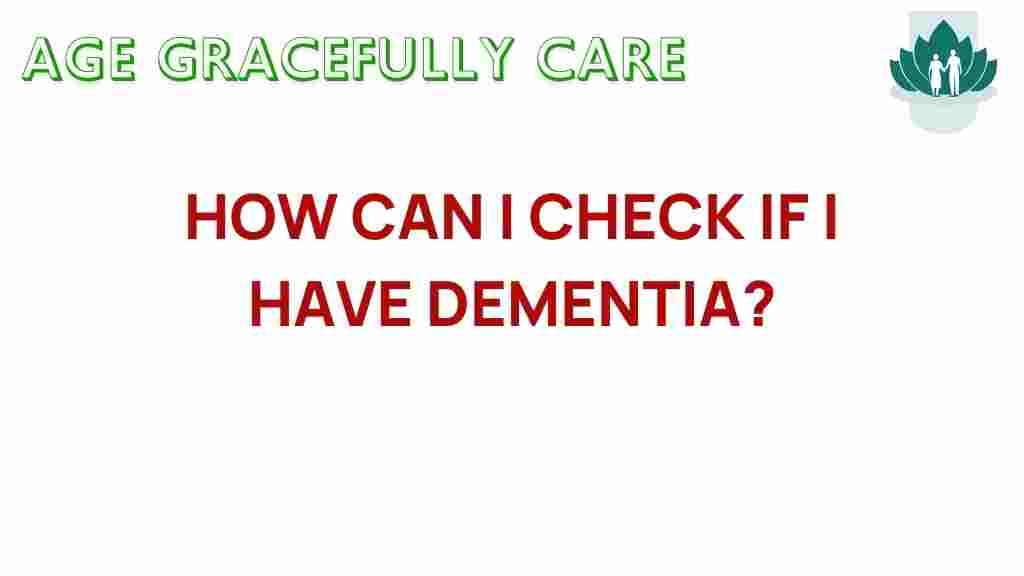Unraveling the Mystery: How Can I Check If I Have Dementia?
Dementia is a broad term used to describe a range of cognitive health issues that affect memory, thinking, and social abilities significantly enough to interfere with daily life. As we age, it becomes increasingly important to be aware of the early signs of dementia and how to address them. If you or a loved one has been experiencing memory loss or other cognitive difficulties, understanding the steps to check for dementia can be crucial. In this article, we will explore the early signs of dementia, the diagnosis process, and ways to enhance brain health.
Understanding Dementia and Memory Loss
Dementia is not a specific disease but rather a syndrome characterized by a decline in mental function. Most commonly associated with aging, it often manifests through memory loss, impaired reasoning, and changes in behavior. Early detection is vital for effective management and treatment. Here are some key points about dementia:
- Types of Dementia: There are several types of dementia, including Alzheimer’s disease, vascular dementia, and Lewy body dementia.
- Memory Loss: This is one of the most common early signs of dementia. Individuals may forget recent events, conversations, or the names of familiar people.
- Cognitive Health: Maintaining cognitive health is essential for overall well-being. Engaging in mental exercises, staying socially active, and leading a healthy lifestyle can help.
Early Signs of Dementia
Recognizing the early signs of dementia can lead to timely intervention. Common early signs to watch for include:
- Memory loss that disrupts daily life, such as forgetting important dates or events.
- Challenges in planning or solving problems, like difficulty following a recipe.
- Difficulty completing familiar tasks at home, work, or leisure.
- Confusion with time or place, including forgetting where you are or how you got there.
- Changes in mood and personality, which may include increased anxiety or depression.
If you notice these signs in yourself or someone close to you, it’s essential to take action. Early detection can lead to better outcomes and more effective treatment options.
How to Check for Dementia: Step-by-Step Process
If you’re concerned about dementia, here’s a step-by-step process to assess your cognitive health:
1. Self-Assessment
Begin with a self-assessment. Reflect on your memory and cognitive abilities. Consider keeping a journal of any memory lapses or cognitive difficulties you experience.
2. Speak to Family and Friends
Talk to close family members or friends about your concerns. They may have noticed changes that you have not recognized.
3. Take a Screening Test
Many online resources offer cognitive screening tests. These can help identify potential issues with memory, attention, or problem-solving. While not a substitute for professional diagnosis, they can provide initial insights into your cognitive health. One valuable resource is the Alzheimer’s Association website, which offers screening tools and information.
4. Consult a Healthcare Professional
If your self-assessment raises concerns, it’s time to consult a healthcare professional. They can conduct a thorough evaluation and may recommend further tests.
5. Undergo Diagnostic Tests
Healthcare professionals may use various diagnostic tools to assess your cognitive health, including:
- Cognitive Tests: These tests measure memory, problem-solving skills, attention, and language abilities.
- Medical History Review: A physician will review your medical history and any medications you’re taking, as some drugs can affect cognitive health.
- Brain Imaging: Imaging tests like MRIs or CT scans may be used to rule out other causes of cognitive decline, such as tumors or strokes.
Troubleshooting Tips for Cognitive Health
If you’ve been diagnosed with dementia or are experiencing signs of memory loss, consider the following tips to support your cognitive health:
- Stay Mentally Active: Engage in activities that challenge your brain, such as puzzles, reading, or learning new skills.
- Stay Physically Active: Regular exercise can improve blood flow to the brain and enhance cognitive function.
- Eat a Healthy Diet: A balanced diet rich in fruits, vegetables, whole grains, and lean proteins can support brain health.
- Stay Socially Engaged: Maintain social connections to reduce feelings of isolation and depression.
- Manage Stress: Practice relaxation techniques such as meditation, yoga, or deep breathing exercises to support mental health.
The Importance of Awareness and Support
Raising awareness about dementia is crucial in fostering understanding and support for those affected. Join local support groups or online communities to connect with others facing similar challenges. Education and support can empower individuals and families to navigate the complexities of dementia together.
Conclusion
Understanding how to check for dementia is essential for anyone concerned about their cognitive health or that of a loved one. Early signs of memory loss and cognitive decline should not be ignored. By taking proactive steps—including self-assessment, consulting healthcare professionals, and utilizing available resources—you can better understand your brain health and seek appropriate interventions.
Remember, while aging is a natural process, significant changes in cognitive health are not a normal part of aging. By staying informed and engaged, you can take charge of your cognitive health and enhance your quality of life. If you want to learn more about maintaining brain health, consider exploring more resources on the National Institute on Aging’s website.
This article is in the category Health and created by AgeGracefullyCare Team
